外研高一必修2 Module 6 Films and TV Programmes模块复习课件(47张)
文档属性
| 名称 | 外研高一必修2 Module 6 Films and TV Programmes模块复习课件(47张) |
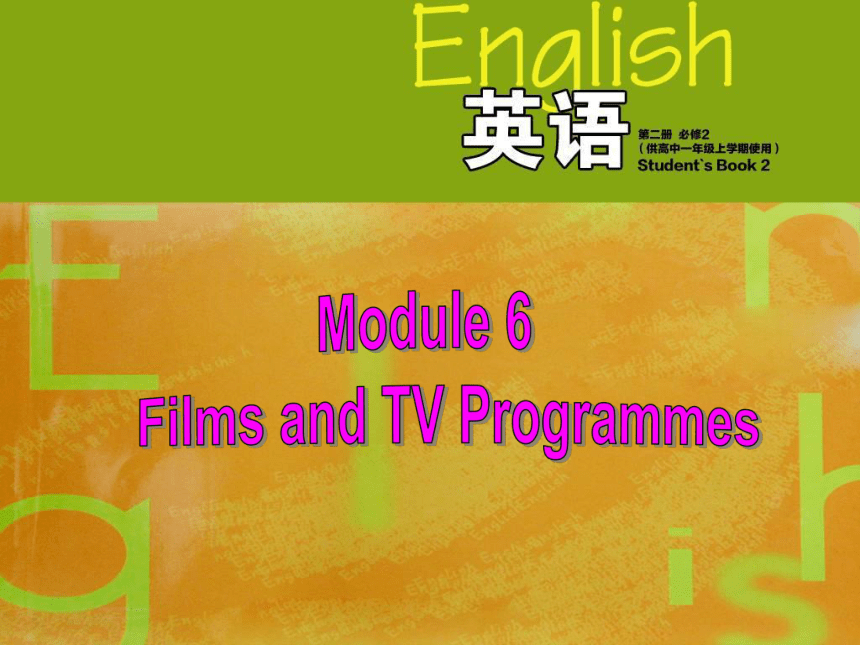
|
|
| 格式 | zip | ||
| 文件大小 | 405.6KB | ||
| 资源类型 | 教案 | ||
| 版本资源 | 外研版 | ||
| 科目 | 英语 | ||
| 更新时间 | 2017-01-18 20:07:57 | ||
图片预览

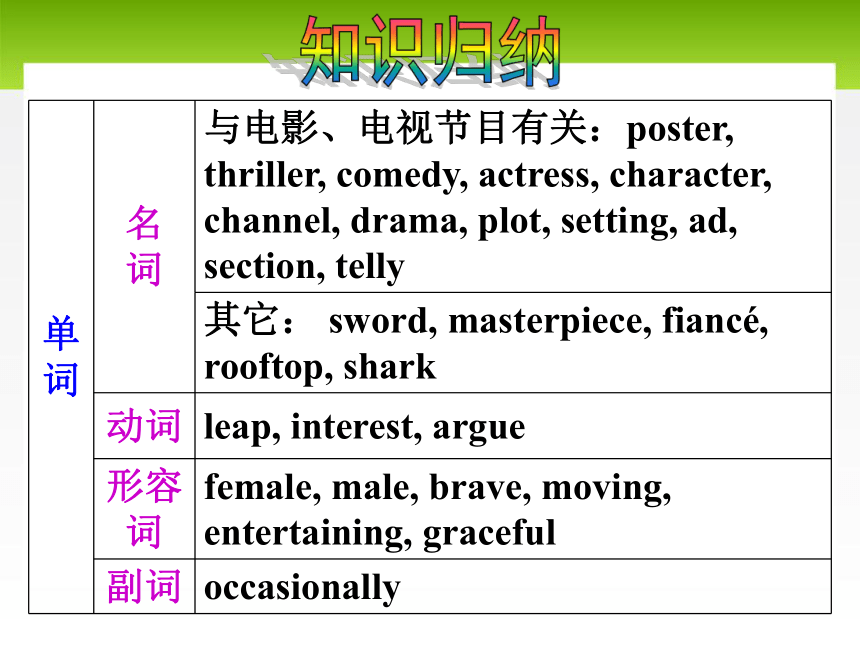
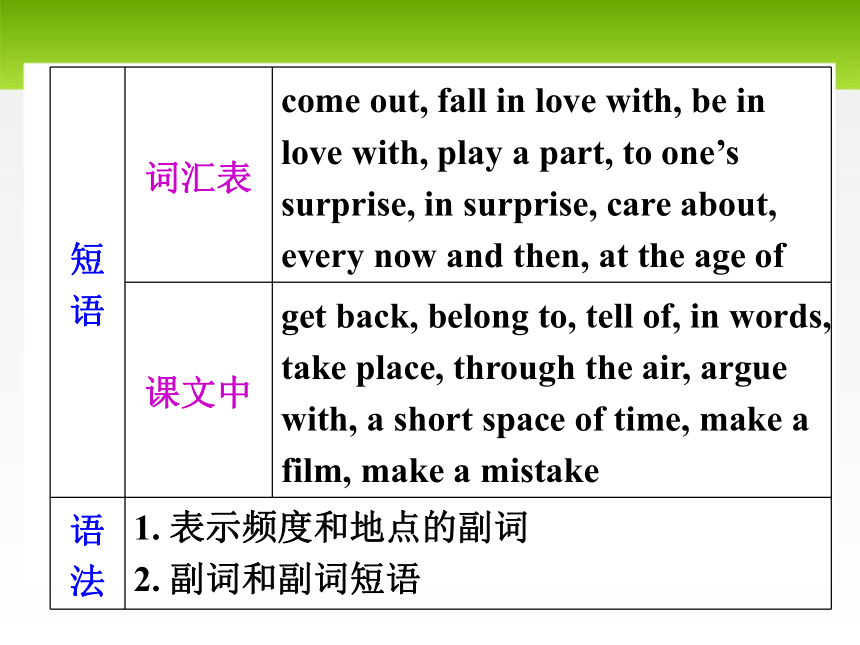
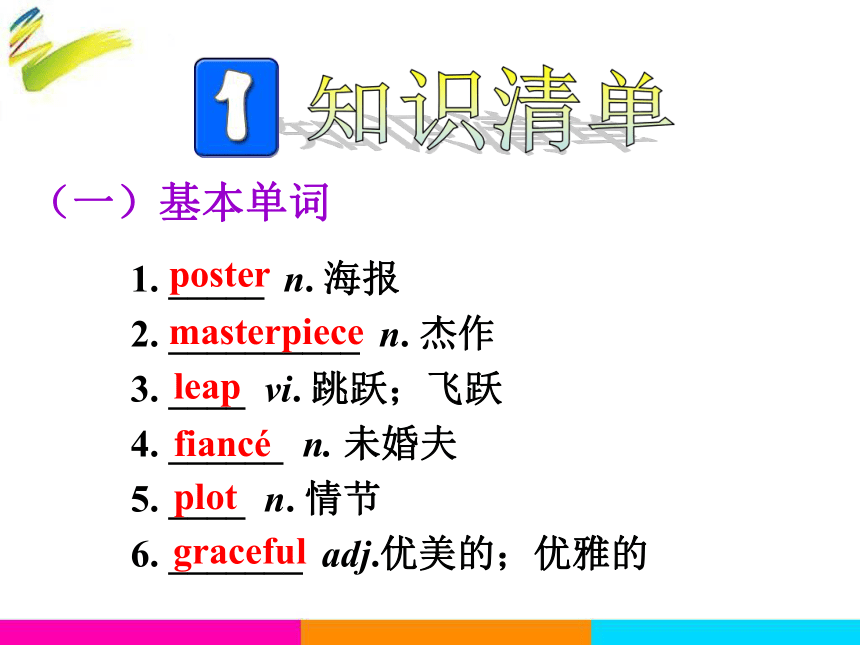
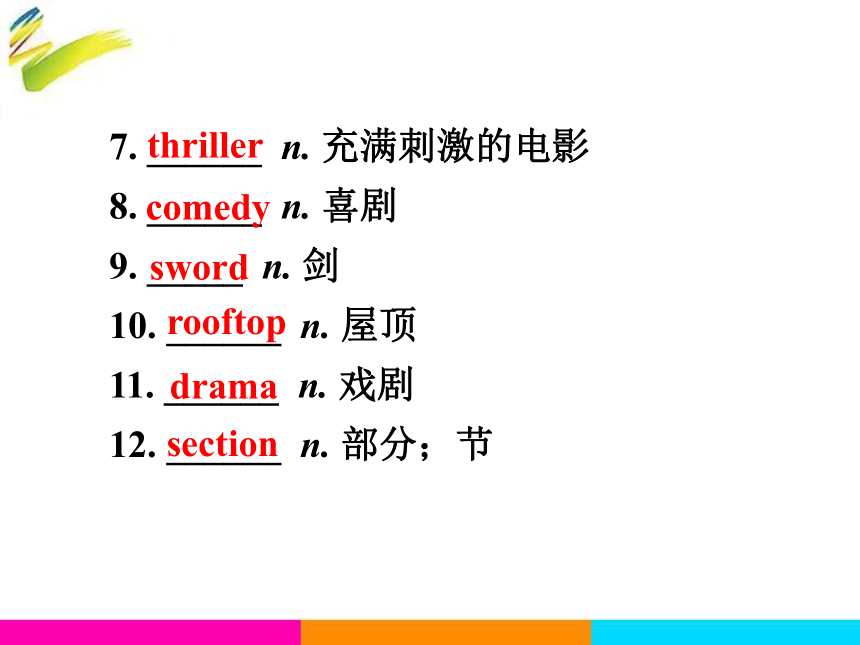
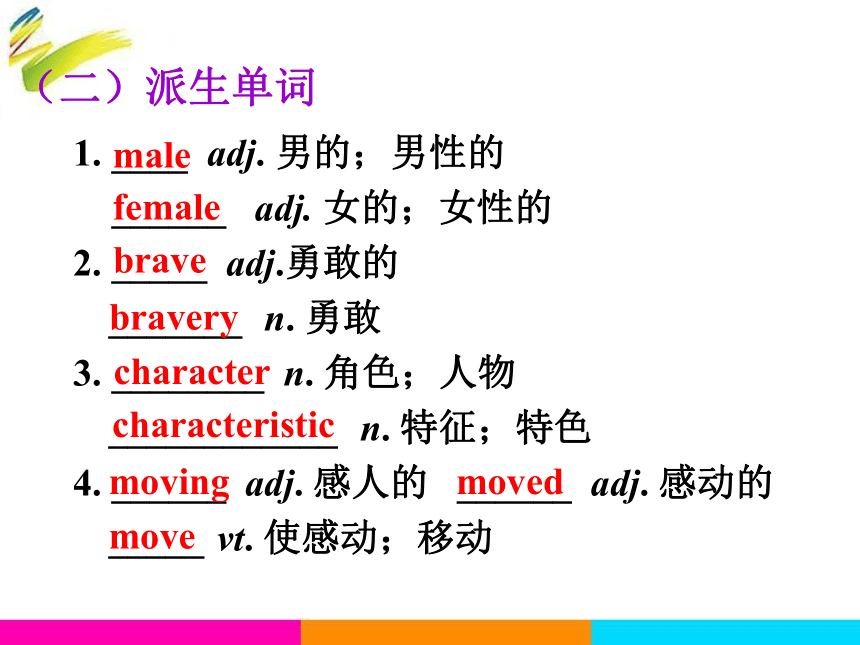
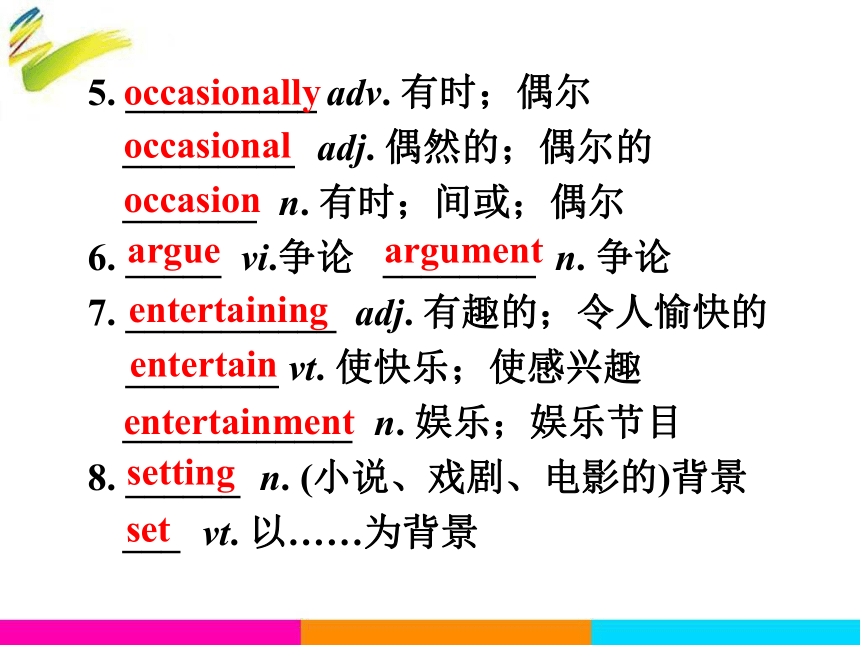
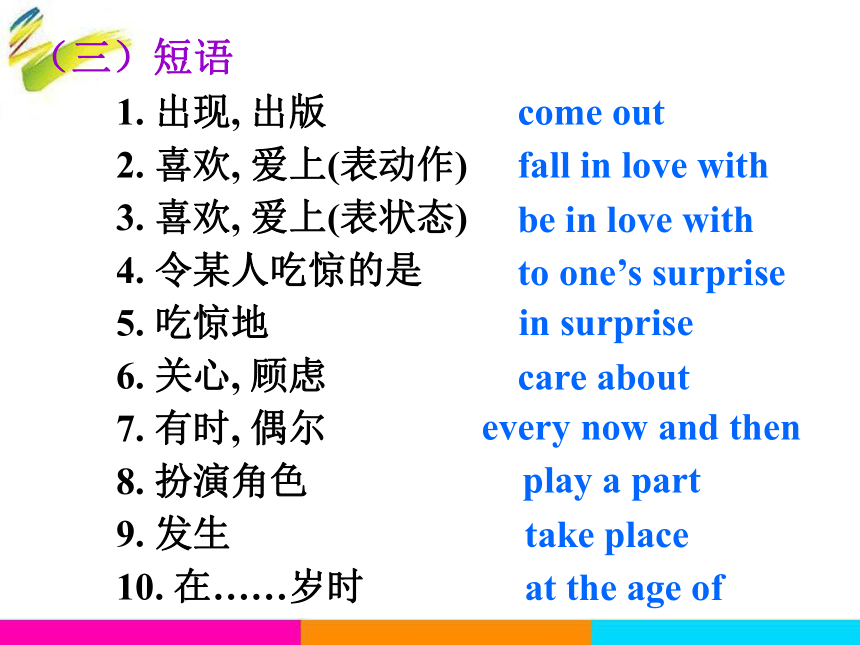
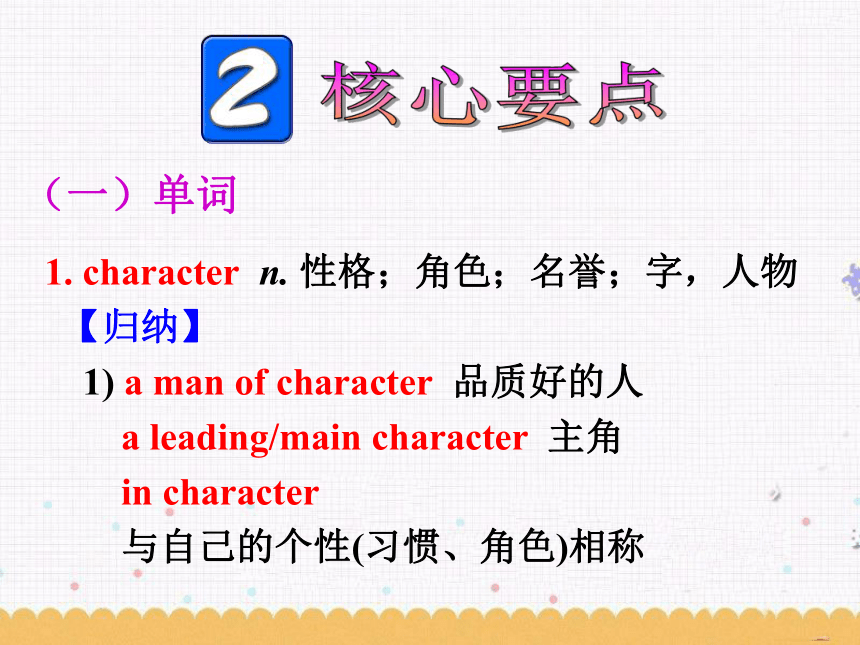
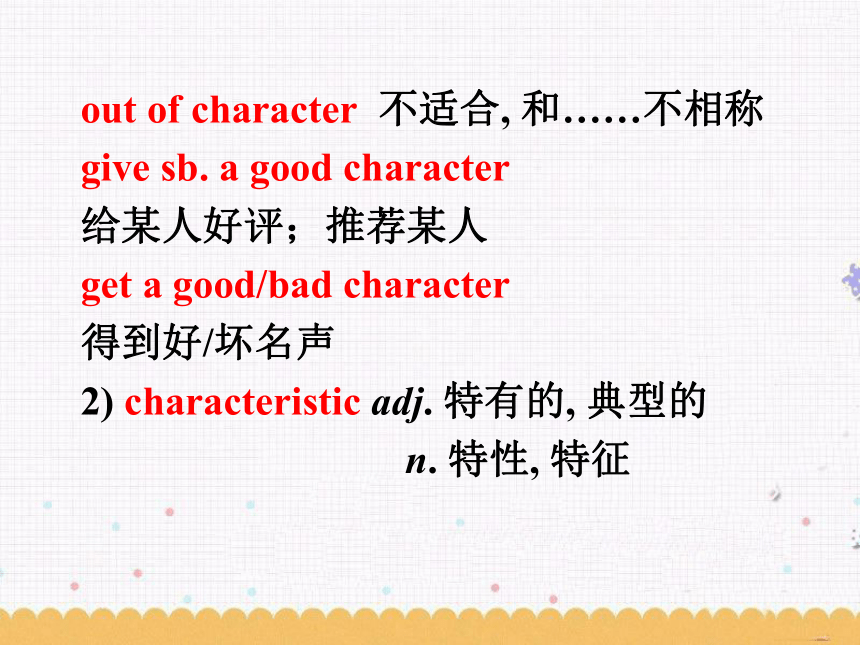
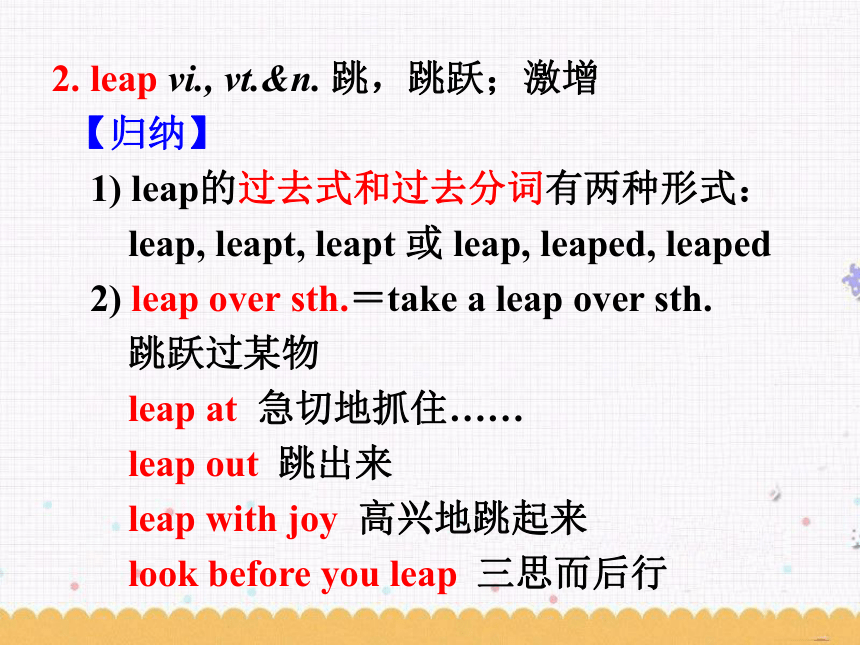
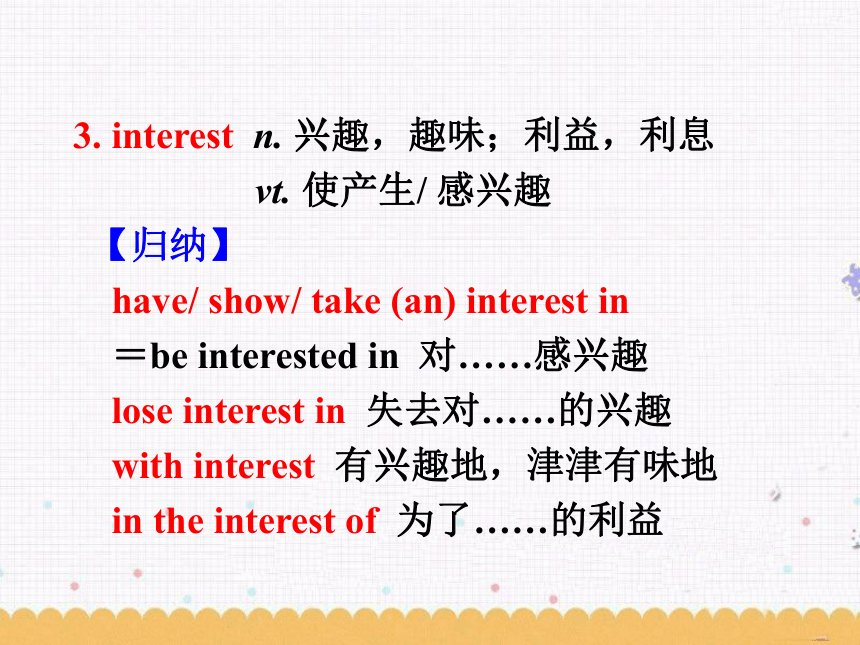
文档简介
课件47张PPT。Module 6
Films and TV Programmes 知识归纳1. _____ n. 海报
2. __________ n. 杰作
3. ____ vi. 跳跃;飞跃
4. ______ n. 未婚夫
5. ____ n. 情节
6. _______ adj.优美的;优雅的知识清单(一)基本单词postermasterpieceleapfiancéplotgraceful7. ______ n. 充满刺激的电影
8. ______ n. 喜剧
9. _____ n. 剑
10. ______ n. 屋顶
11. ______ n. 戏剧
12. ______ n. 部分;节thrillercomedyswordrooftopdramasection1. ____ adj. 男的;男性的
______ adj. 女的;女性的
2. _____ adj.勇敢的
_______ n. 勇敢
3. ________ n. 角色;人物
____________ n. 特征;特色
4. ______ adj. 感人的 ______ adj. 感动的
_____ vt. 使感动;移动(二)派生单词malefemalebravebraverycharactercharacteristicmovingmovedmove5. __________ adv. 有时;偶尔
_________ adj. 偶然的;偶尔的
_______ n. 有时;间或;偶尔
6. _____ vi.争论 ________ n. 争论
7. ___________ adj. 有趣的;令人愉快的
________ vt. 使快乐;使感兴趣
____________ n. 娱乐;娱乐节目
8. ______ n. (小说、戏剧、电影的)背景
___ vt. 以……为背景occasionallyoccasionaloccasionargueargumententertainingentertainentertainmentsettingset1. 出现, 出版
2. 喜欢, 爱上(表动作)
3. 喜欢, 爱上(表状态)
4. 令某人吃惊的是
5. 吃惊地
6. 关心, 顾虑
7. 有时, 偶尔
8. 扮演角色
9. 发生
10. 在……岁时(三)短语come outfall in love withbe in love withto one’s surprisein surprisecare aboutevery now and thenplay a parttake placeat the age of1. character n. 性格;角色;名誉;字,人物
【归纳】
1) a man of character 品质好的人
a leading/main character 主角
in character
与自己的个性(习惯、角色)相称核心要点(一)单词out of character 不适合, 和……不相称
give sb. a good character
给某人好评;推荐某人
get a good/bad character
得到好/坏名声
2) characteristic adj. 特有的, 典型的
n. 特性, 特征2. leap vi., vt.&n. 跳,跳跃;激增
【归纳】
1) leap的过去式和过去分词有两种形式:
leap, leapt, leapt 或 leap, leaped, leaped
2) leap over sth.=take a leap over sth.
跳跃过某物
leap at 急切地抓住……
leap out 跳出来
leap with joy 高兴地跳起来
look before you leap 三思而后行3. interest n. 兴趣,趣味;利益,利息
vt. 使产生/ 感兴趣
【归纳】
have/ show/ take (an) interest in
=be interested in 对……感兴趣
lose interest in 失去对……的兴趣
with interest 有兴趣地,津津有味地
in the interest of 为了……的利益4. argue v. 争论, 辩论; 主张, 表明
【归纳】
1) argue with sb. on/ about/ over sth.
与某人争论某事
argue against/for 为反对/赞成……而辩论
argue sb. into/ out of doing sth.
说服某人做/ 不做某事
argue+that clause 认为(一个观点)
2) argument n. 争论,辩论,论据
have an argument with 与……争吵5. entertaining adj. 有趣的;令人愉快的
【拓展】
1) entertain v. 招待;有兴趣
entertain sb. to sth. 款待某人
entertain sb. with sth.(用……)使某人快乐
2) entertainer n. (娱乐的)表演者;艺人
3) entertainment n. 娱乐;款待
注意:entertain指“使欢乐, 使娱乐; 招待,
款待”时, 只能跟人作宾语, 不能跟物。1. come out 出现,出版;开花;结果是;褪色
【拓展】
come across 偶然碰见
come about 发生; 产生
come down 降低; 下降; 着陆
come over 顺便访问; 过来
come to 总计; 谈到; 恢复知觉; 苏醒
come up 发生; 提及; 走过来
come on 赶快; 进行; 登台; 得了吧(二)短语2. in surprise 吃惊地,惊讶地
【拓展】
1) to one’s surprise=to the surprise of sb.
令某人惊奇的是
take... by surprise 出其不意地袭击……
be a great surprise to sb.
对某人来说是件惊人的事
What a surprise! 多么令人吃惊啊!
2) be surprised at 对……感到惊讶
be surprised to do sth. 做某事感到吃惊I. 根据本模块所学单词及提示写出所缺单词的正确形式。
1. Everyone recognizes Disney’s
cartoon __________ (人物) .
2. The Last Supper is widely regarded
as Leonardo da Vinci’s m_________.masterpiece? characters ?3. It was b______ of her to go into the burning building.
4. They were a________ about which film to go and see.
5. The ________ (背景) of the story is a hotel in Paris during the war.setting brave?arguing?II. 用括号内单词的正确形式填空。
2. Her father was a quiet man with
________ (grace) manners.
2. The song was so ________ (move) it
made me cry.
3. It snowed __________ (occasional) but
not enough for skiing.
4. Children’s TV programmes nowadays
are much more __________ (entertain).entertaininggraceful? ??moving??occasionallyIII. 选用方框内合适的短语并用其正确形式填空(有两个多余选项)。??? come out, play a part, to one’s
surprise, care about, every now
and then, at the age of1. Health education will __________ in preparing us for old age.
2. Much _____________, the restaurant was actually very nice.to my surprise? play a part3. After the storm, the sun ________ later in the afternoon.
4. Your parents are only doing this because they __________ you.
5. ____________ sixteen he qualified for a place at the University of Hamburg.
6. Mary comes to visit us _____________
____.every now andcame out? ??care aboutAt the age of?then1. But it’s generally agreed, that he, more than anyone else in the history of films, understands the meaning of the word “entertainment”.
但是,人们一致认为他比电影史上的任何一个人都更能理解“娱乐”这个词的意思。(三)句式It is generally agreed that...
人们一致同意……
在这个句型中,it是形式主语,真正的主语是后面的that引导的主语从句,而且此处的it不可用其他词,如this,that等来代替。在英语中,只有it可作形式主语。与此类似的句型还有:It is/was believed that... 人们相信……
It is/was known that... 众所周知……
It is/was estimated that... 据估计……
It is/was reported that... 据报道……
It is/was proved that... 据证实……
It is/was said that... 据说……
It is/was thought that... 人们认为……
It is/was supposed that... 人们认为……
It is/was hoped that... 人们希望……
It is/was proposed that... 有人建议……e.g.
It was agreed that Mr Rollins would sign the contract on May 1st.
约定罗林斯先生于5月1日在合同上签字。
It is reported that twenty men were killed in the conflict.
据报道20个人在这次冲突中遇害。
It was said that he would go to America for further study.
据说他将去美国深造。2. The action takes place on Peking rooftops, and in places as far as the deserts of western China.
打斗发生在北京的屋顶之上和遥远的中国西部的沙漠之中。
and in places和on Peking rooftops是并列的地点状语;as far away as...作后置定语的修饰名词places。
as/so far as 远至……;就……;尽……。作连接词,用法如下:1) 后接地点名词,“远至……”;“达到”。
e.g. I can see as/so far as the bridge from
here.
2) 后接从句,“就……”;“尽……”。
e.g. As/So far as I know, he has not passed
the exam.
I’ve promised to help you as far as I can.【拓展】
as far as... be concerned 就……而言
as far as...go 就……的情况而言
as far as our knowledge goes 就我们所知
as far as one can see 就某人所能判断的
as far as I know 据我所知语法副词(词组)用法小结
一、副词(词组)在句中的作用
副词在句中主要作修饰成分,可修饰动词、形容词、副词和介词等;副词主要在句中作状语,表示时间、地点、方式等意义,有时也可作表语、定语、宾补等。二、副词(词组)的分类
1. 按词的构成,副词分为简单副词(如well, only)、复合副词(如somewhere, therefore)和派生副词(如aloud, clearly)。
2. 按功用,副词(词组)可分为:
★修饰性副词(词组)。如:★连接副词。这类副词用来引导主语从句、宾语从句和表语从句,如how, when, where, why;也可连接并列结构,如consequently, however, moreover, therefore, though, thus等。
★句子副词。这类副词修饰整个句子,如actually, certainly, absolutely, obviously, really等。
★解释性副词。如namely(即), as。
★疑问副词。这类副词用来构成特殊疑问句,如how, where, when, why。
★关系副词。这类副词用来引导定语从句,如when, where, why。
★感叹副词。这类副词用来引导感叹句,如how, what。三、副词(词组)的位置按照正确的语序将下列每组单词组成一个陈
述句。
1. always, gardening, loved, has, she
She has always loved gardening.
2. started, David, learn, to, language, a, new, totally
David started to learn a totally new language.3. fully, can, understand, at, I, often, is,
he, why, by, others, laughed
I can fully understand why he is often laughed at by others.
4. the, field, in, hard, they, were, working, afternoon, yesterday
They were working hard in the field yesterday afternoon.写作如何写影视评论【写作指导】
1. 审题定调:
影评,就是对一部电影的导演、演员、故事情节等进行介绍,并表达自己的看法和感受。2. 确定主体内容:
全文可分为三部分:
第一部分:介绍该影片的基本情况,包括类型、导演和主演等;
第二部分:介绍该影片的情节;
第三部分:分析该影片的亮点。
3. 确定人称、时态:
人称用第三人称。介绍电影内容、发表自己的看法通常用一般现在时。4. 常用表达:
... is directed by ...
The story takes place in / on ...
It is both entertaining and moving.巩固练习I. 根据括号内的提示翻译下列句子。
杰克很少谈论他的工作。 (rarely)??
Jack rarely talked about his own work.
2. 约翰的病迫使他每隔一天就去看一次医生。 (every two days) ??????
John’s illness forced him to see the doctor every two days.3. 爸爸有时陪我们去健身房, 虽然他不喜欢去那里。 (sometimes)
Father sometimes goes to the gym with us although he dislikes going there.
4. 我听说最近这些日子他不常回家。 (seldom) ??????
I hear that he seldom goes back home these days.II. 阅读下面材料, 在空白处填入适当的内容(不多于3个单词)或括号内单词的正确形式。
At one time, I never used to like television series. I used to think they were cheap and 1. ________ (bore). I mean, why would you be interested in watching a TV programme with the same actors and actresses playing the same characters doing almost the same things every week? I used to think filmsboring? ? were much better. It took more money 2.
________ (make) them, their settings
were more expensive and looked better
and their plots were always different.
Whats more, they had a beginning and an
end. The ending was the most important
part for me as it 3. ________ (mean) the
film was finished 4. ________ there was a
sequel (续集), of course, which I also neverunless ?to makemeant?liked because a sequel reminded me 5.
____ a TV series.
Then one day, I was 6. ________ some
friends and we were all feeling down and one
of us said he needed some comedy. He had
some DVDs of a comedy series and put some
of them 7. _____. Every episode (集) was
really funny and he knew they were going to
be funny; even 8. _____ ones he hadn’t the ? ? of?with? on?seen. Then I understood why people watch TV
series: they know 9. _______ to expect from
them. They know every episode is going to be
funny if it’s a comedy, or exciting if it’s a
thriller, or moving if it’s a drama. Films,
however, are all different. Of course,
sometimes the 10. ___________ (expect) can be
more entertaining than the expected. But,
sometimes, the expected can be comforting
and, quite often, that’s just what people want.unexpectedwhat???
Films and TV Programmes 知识归纳1. _____ n. 海报
2. __________ n. 杰作
3. ____ vi. 跳跃;飞跃
4. ______ n. 未婚夫
5. ____ n. 情节
6. _______ adj.优美的;优雅的知识清单(一)基本单词postermasterpieceleapfiancéplotgraceful7. ______ n. 充满刺激的电影
8. ______ n. 喜剧
9. _____ n. 剑
10. ______ n. 屋顶
11. ______ n. 戏剧
12. ______ n. 部分;节thrillercomedyswordrooftopdramasection1. ____ adj. 男的;男性的
______ adj. 女的;女性的
2. _____ adj.勇敢的
_______ n. 勇敢
3. ________ n. 角色;人物
____________ n. 特征;特色
4. ______ adj. 感人的 ______ adj. 感动的
_____ vt. 使感动;移动(二)派生单词malefemalebravebraverycharactercharacteristicmovingmovedmove5. __________ adv. 有时;偶尔
_________ adj. 偶然的;偶尔的
_______ n. 有时;间或;偶尔
6. _____ vi.争论 ________ n. 争论
7. ___________ adj. 有趣的;令人愉快的
________ vt. 使快乐;使感兴趣
____________ n. 娱乐;娱乐节目
8. ______ n. (小说、戏剧、电影的)背景
___ vt. 以……为背景occasionallyoccasionaloccasionargueargumententertainingentertainentertainmentsettingset1. 出现, 出版
2. 喜欢, 爱上(表动作)
3. 喜欢, 爱上(表状态)
4. 令某人吃惊的是
5. 吃惊地
6. 关心, 顾虑
7. 有时, 偶尔
8. 扮演角色
9. 发生
10. 在……岁时(三)短语come outfall in love withbe in love withto one’s surprisein surprisecare aboutevery now and thenplay a parttake placeat the age of1. character n. 性格;角色;名誉;字,人物
【归纳】
1) a man of character 品质好的人
a leading/main character 主角
in character
与自己的个性(习惯、角色)相称核心要点(一)单词out of character 不适合, 和……不相称
give sb. a good character
给某人好评;推荐某人
get a good/bad character
得到好/坏名声
2) characteristic adj. 特有的, 典型的
n. 特性, 特征2. leap vi., vt.&n. 跳,跳跃;激增
【归纳】
1) leap的过去式和过去分词有两种形式:
leap, leapt, leapt 或 leap, leaped, leaped
2) leap over sth.=take a leap over sth.
跳跃过某物
leap at 急切地抓住……
leap out 跳出来
leap with joy 高兴地跳起来
look before you leap 三思而后行3. interest n. 兴趣,趣味;利益,利息
vt. 使产生/ 感兴趣
【归纳】
have/ show/ take (an) interest in
=be interested in 对……感兴趣
lose interest in 失去对……的兴趣
with interest 有兴趣地,津津有味地
in the interest of 为了……的利益4. argue v. 争论, 辩论; 主张, 表明
【归纳】
1) argue with sb. on/ about/ over sth.
与某人争论某事
argue against/for 为反对/赞成……而辩论
argue sb. into/ out of doing sth.
说服某人做/ 不做某事
argue+that clause 认为(一个观点)
2) argument n. 争论,辩论,论据
have an argument with 与……争吵5. entertaining adj. 有趣的;令人愉快的
【拓展】
1) entertain v. 招待;有兴趣
entertain sb. to sth. 款待某人
entertain sb. with sth.(用……)使某人快乐
2) entertainer n. (娱乐的)表演者;艺人
3) entertainment n. 娱乐;款待
注意:entertain指“使欢乐, 使娱乐; 招待,
款待”时, 只能跟人作宾语, 不能跟物。1. come out 出现,出版;开花;结果是;褪色
【拓展】
come across 偶然碰见
come about 发生; 产生
come down 降低; 下降; 着陆
come over 顺便访问; 过来
come to 总计; 谈到; 恢复知觉; 苏醒
come up 发生; 提及; 走过来
come on 赶快; 进行; 登台; 得了吧(二)短语2. in surprise 吃惊地,惊讶地
【拓展】
1) to one’s surprise=to the surprise of sb.
令某人惊奇的是
take... by surprise 出其不意地袭击……
be a great surprise to sb.
对某人来说是件惊人的事
What a surprise! 多么令人吃惊啊!
2) be surprised at 对……感到惊讶
be surprised to do sth. 做某事感到吃惊I. 根据本模块所学单词及提示写出所缺单词的正确形式。
1. Everyone recognizes Disney’s
cartoon __________ (人物) .
2. The Last Supper is widely regarded
as Leonardo da Vinci’s m_________.masterpiece? characters ?3. It was b______ of her to go into the burning building.
4. They were a________ about which film to go and see.
5. The ________ (背景) of the story is a hotel in Paris during the war.setting brave?arguing?II. 用括号内单词的正确形式填空。
2. Her father was a quiet man with
________ (grace) manners.
2. The song was so ________ (move) it
made me cry.
3. It snowed __________ (occasional) but
not enough for skiing.
4. Children’s TV programmes nowadays
are much more __________ (entertain).entertaininggraceful? ??moving??occasionallyIII. 选用方框内合适的短语并用其正确形式填空(有两个多余选项)。??? come out, play a part, to one’s
surprise, care about, every now
and then, at the age of1. Health education will __________ in preparing us for old age.
2. Much _____________, the restaurant was actually very nice.to my surprise? play a part3. After the storm, the sun ________ later in the afternoon.
4. Your parents are only doing this because they __________ you.
5. ____________ sixteen he qualified for a place at the University of Hamburg.
6. Mary comes to visit us _____________
____.every now andcame out? ??care aboutAt the age of?then1. But it’s generally agreed, that he, more than anyone else in the history of films, understands the meaning of the word “entertainment”.
但是,人们一致认为他比电影史上的任何一个人都更能理解“娱乐”这个词的意思。(三)句式It is generally agreed that...
人们一致同意……
在这个句型中,it是形式主语,真正的主语是后面的that引导的主语从句,而且此处的it不可用其他词,如this,that等来代替。在英语中,只有it可作形式主语。与此类似的句型还有:It is/was believed that... 人们相信……
It is/was known that... 众所周知……
It is/was estimated that... 据估计……
It is/was reported that... 据报道……
It is/was proved that... 据证实……
It is/was said that... 据说……
It is/was thought that... 人们认为……
It is/was supposed that... 人们认为……
It is/was hoped that... 人们希望……
It is/was proposed that... 有人建议……e.g.
It was agreed that Mr Rollins would sign the contract on May 1st.
约定罗林斯先生于5月1日在合同上签字。
It is reported that twenty men were killed in the conflict.
据报道20个人在这次冲突中遇害。
It was said that he would go to America for further study.
据说他将去美国深造。2. The action takes place on Peking rooftops, and in places as far as the deserts of western China.
打斗发生在北京的屋顶之上和遥远的中国西部的沙漠之中。
and in places和on Peking rooftops是并列的地点状语;as far away as...作后置定语的修饰名词places。
as/so far as 远至……;就……;尽……。作连接词,用法如下:1) 后接地点名词,“远至……”;“达到”。
e.g. I can see as/so far as the bridge from
here.
2) 后接从句,“就……”;“尽……”。
e.g. As/So far as I know, he has not passed
the exam.
I’ve promised to help you as far as I can.【拓展】
as far as... be concerned 就……而言
as far as...go 就……的情况而言
as far as our knowledge goes 就我们所知
as far as one can see 就某人所能判断的
as far as I know 据我所知语法副词(词组)用法小结
一、副词(词组)在句中的作用
副词在句中主要作修饰成分,可修饰动词、形容词、副词和介词等;副词主要在句中作状语,表示时间、地点、方式等意义,有时也可作表语、定语、宾补等。二、副词(词组)的分类
1. 按词的构成,副词分为简单副词(如well, only)、复合副词(如somewhere, therefore)和派生副词(如aloud, clearly)。
2. 按功用,副词(词组)可分为:
★修饰性副词(词组)。如:★连接副词。这类副词用来引导主语从句、宾语从句和表语从句,如how, when, where, why;也可连接并列结构,如consequently, however, moreover, therefore, though, thus等。
★句子副词。这类副词修饰整个句子,如actually, certainly, absolutely, obviously, really等。
★解释性副词。如namely(即), as。
★疑问副词。这类副词用来构成特殊疑问句,如how, where, when, why。
★关系副词。这类副词用来引导定语从句,如when, where, why。
★感叹副词。这类副词用来引导感叹句,如how, what。三、副词(词组)的位置按照正确的语序将下列每组单词组成一个陈
述句。
1. always, gardening, loved, has, she
She has always loved gardening.
2. started, David, learn, to, language, a, new, totally
David started to learn a totally new language.3. fully, can, understand, at, I, often, is,
he, why, by, others, laughed
I can fully understand why he is often laughed at by others.
4. the, field, in, hard, they, were, working, afternoon, yesterday
They were working hard in the field yesterday afternoon.写作如何写影视评论【写作指导】
1. 审题定调:
影评,就是对一部电影的导演、演员、故事情节等进行介绍,并表达自己的看法和感受。2. 确定主体内容:
全文可分为三部分:
第一部分:介绍该影片的基本情况,包括类型、导演和主演等;
第二部分:介绍该影片的情节;
第三部分:分析该影片的亮点。
3. 确定人称、时态:
人称用第三人称。介绍电影内容、发表自己的看法通常用一般现在时。4. 常用表达:
... is directed by ...
The story takes place in / on ...
It is both entertaining and moving.巩固练习I. 根据括号内的提示翻译下列句子。
杰克很少谈论他的工作。 (rarely)??
Jack rarely talked about his own work.
2. 约翰的病迫使他每隔一天就去看一次医生。 (every two days) ??????
John’s illness forced him to see the doctor every two days.3. 爸爸有时陪我们去健身房, 虽然他不喜欢去那里。 (sometimes)
Father sometimes goes to the gym with us although he dislikes going there.
4. 我听说最近这些日子他不常回家。 (seldom) ??????
I hear that he seldom goes back home these days.II. 阅读下面材料, 在空白处填入适当的内容(不多于3个单词)或括号内单词的正确形式。
At one time, I never used to like television series. I used to think they were cheap and 1. ________ (bore). I mean, why would you be interested in watching a TV programme with the same actors and actresses playing the same characters doing almost the same things every week? I used to think filmsboring? ? were much better. It took more money 2.
________ (make) them, their settings
were more expensive and looked better
and their plots were always different.
Whats more, they had a beginning and an
end. The ending was the most important
part for me as it 3. ________ (mean) the
film was finished 4. ________ there was a
sequel (续集), of course, which I also neverunless ?to makemeant?liked because a sequel reminded me 5.
____ a TV series.
Then one day, I was 6. ________ some
friends and we were all feeling down and one
of us said he needed some comedy. He had
some DVDs of a comedy series and put some
of them 7. _____. Every episode (集) was
really funny and he knew they were going to
be funny; even 8. _____ ones he hadn’t the ? ? of?with? on?seen. Then I understood why people watch TV
series: they know 9. _______ to expect from
them. They know every episode is going to be
funny if it’s a comedy, or exciting if it’s a
thriller, or moving if it’s a drama. Films,
however, are all different. Of course,
sometimes the 10. ___________ (expect) can be
more entertaining than the expected. But,
sometimes, the expected can be comforting
and, quite often, that’s just what people want.unexpectedwhat???
